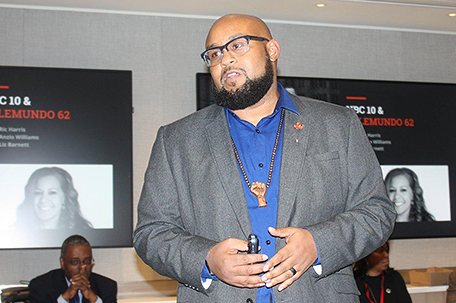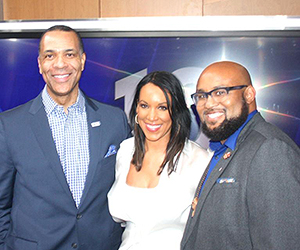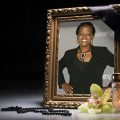
ABOVE PHOTO: PABJ president Manuel McDonnell Smith speaking at monthly PABJ meeting.
Mindful of the organization’s history, Smith has gone back to basics with a strong push toward the future.
By Amy V. Simmons
The Philadelphia Association of Black Journalists was founded in 1974, not long after the findings of the National Advisory Commission on Civil Disorders (also known as the Kerner Commission after chairman Otto Kerner) were published in 1968. President Lyndon Johnson charged the commission with uncovering the underlying factors behind the 1967 race riots.
As a result of the report’s recommendations, many of those who once restricted African Americans from the nation’s mainstream newsrooms and other mediums began to make small improvements regarding their hiring practices.
The founders of PABJ envisioned their new organization as a safe space where these reporters could compare notes, receive professional development training and advocate for each other. Everything they did was also for the communities they covered and lived in.
Following years of deregulation, media consolidation and technological advances, the modest gains made in those early years have been lost. However, new opportunities have been created via technology-based vehicles such as blogs, nonprofit newspapers, live streaming and more. African Americans have more control of the narrative about their own community than ever before.
These innovations present a question of balance – the ability to produce relevant, engaging content that reflects the realities of modern society, yet which remains true to the basic tenets of professional journalism.
This is a challenge that Manuel McDonnell Smith — PABJ’s current president — relishes. The SUN recently had a chance to speak with him about his own vision for the organization going forward.
SUN: How did you first become involved with PABJ and why? What attracted you to the organization?
MMS: It’s an interesting story. I always tell people that I really did not decide to become a journalist until my senior year of high school. Because I had a bit of a sheltered childhood, when we moved to West Philly, I went to University City High School, and kind of went crazy socially…I was late for school every day. Turns out that Mr. Pinto, who was the English teacher, was the sponsor of the detention room. He said, ‘You’re here all the time, so you might as well write for the school paper.’
To me, that was the first time I [realized that] this was an industry and something I could do. I came out of high school and had some really good internships here in town. I [then] worked for Fox and was commuting back and forth to New York, and heard about this group, the Philadelphia Association of Black Journalists. I went to my first meeting in the Flamingo Room [at the Philadelphia Daily News] and saw all of these Black journalists that were engaged and fell in love with it from that point…to me, this was the greatest thing in the world. To see these folks be so passionate about their community and be so passionate about each other was something I had never had a chance to actually experience.
SUN: Is it safe to say that there is a process underway that could be considered a “rebranding” of this organization?
MMS: Yes, there is a rebranding. It’s an unintentional rebranding. That wasn’t what I expected to do, but I think that PABJ needed to get back out there and have a conversation, start talking to people, and let them know that we’re here. I’m willing to partner. Even in the [business] relationships we have now, I’m really intentional about people just not funding us. Where does that relationship go?
[For example], we did the mayoral forum at Community College because we needed some space, but I want to make sure that it’s a two-way street. So, what I really want to get from Community College [long term] is a training program for entrepreneurial journalists. They [CCP] do some business training; how do we get a reinforcement of business training for entrepreneurial journalists who are really good at writing stories, who are really good at getting content, who are really good at doing interviews, but not necessarily good at balancing the books at the end of the month? How do we bring those resources together? That’s something we’re going to work on together.
SUN: African American media professionals have always had to take the lead regarding coverage of the issues and events that impact the community. How is PABJ helping to assist them in this task in 2019, either through training, workshops or other professional development initiatives?
MMS: I think the way you level the playing field [is to consider] when we talk to people who fund organizations — for example, like the grant we got from the Lenfest Institute — that instead of funding around it, or sending someone to a training, [to ask] ‘why don’t we fund the same infrastructure?’ So [for example], on Election Night, we’re going to have a community newsroom at Pipeline, right across from City Hall for independent and freelance journalists. We’re going to have pizza, there will be Facebook Live [opportunities] and free Wi-Fi. You’ll have a collaborative newsroom environment, because I feel like that is the same environment that the other reporters in the mainstream publications will have.
To me, that’s a worthy investment…that’s the place PABJ needs to be. I’m not saying that other companies don’t have a role in helping to support diversity, but really, I’m the only guy coming to the table for the craft and for the people. You [organizations] invest in Philly.com, and yes, there’s probably some people there who are really invested in diversity, but at the end of the day, they want to boost Philly.com’s numbers. My job is to get journalists the tools they need to tell stories.
That’s what I want to use the bully pulpit of PABJ for; I’m less interested in fighting about one editorial that offended everybody, and more interested in having that conversation about how do you have these big companies and there’s no on-ramp for journalists from Philadelphia who have been trained here to do big business with you? Why aren’t you hiring more qualified editorial people who have boots on the ground and know this neighborhood like anybody else, instead of hiring people from out of town?
SUN: Would some of these trainings and programs be open to journalists who aren’t members of the organization?
MMS: I have been very liberal in not forcing people to get memberships. If people are interested in PABJ, I want them to come to one meeting, two meetings. What has been happening is that people come, and they feel like, ‘hey, I have to be a part of this!’ You can join online; we made it easier to join the organization. But I want people to see the value. [For example], you don’t have to be a member to join any of PABJ’s committees. I launched three task forces around three key areas. I felt like people were being underserved by PABJ.

We have an associate member task force which connects media related members to our organization. The real deal is that [while] I know “journalism” is on the front door, and that as a journalist sometimes I’m very [passionate] about my organization, because I can’t go to other ones and be served, or even be elected to office in any other organization, but they [associate members] are a big part of what we do.
We also started an arts and entertainment task force, because I think that a lot of journalists in this town covering arts and entertainment end up feeling marginalized by folks in news. That’s not the way it should be. One of the things I want to do is to make sure that diverse journalists have a place at the table when it comes to these bigger arts and entertainment events in town. When you bring a big concert into town, there’s no reason why you should not have Black journalists on your list for invitations in a serious way, where they can do interviews and have opportunities to talk to people.
But the task force that has my heart is the entrepreneurship journalism task force. [For instance], we have Camari Ellis. Camari is really a financial planner, but is passionate about media and Black wealth. He’s always on Facebook Live, he has a book club, he has a really robust blog. I love the way that he almost feels like a media entrepreneur more than just having a business; he gets it. Then we have another guy, Michael Butler, who is a music reporter and a millennial. Mike’s really into creative writing and writing about things that inspire him. Mike’s the artist, Camari is the business guy, and they’re creating programming that will attract those entrepreneurial members.
We just did a training with Facebook. We got a person from Facebook to come and talk to our members. We’re going to do the same with Google. We want to bring top notch writers; it’s an open invitation. The role of PABJ is that [while] I can’t give every member money to go to a class, I can certainly pay for a train ticket for a top notch journalist to come down, meet with our members, and give them training that they might not have otherwise.
SUN: How does PABJ as a private membership organization help the community at large? I know for a fact that the annual Media Access Workshop has been very important in this regard.
MMS: We’re doubling down on that; our Media Access Workshop is in May. We went away from a model that wasn’t free [of charge] anymore; it’s back to being free. We’re doing it at West Philadelphia High School, in the community. We’re being intentional about it; we have the capacity to invite 100 people that day. I know that there’s going to be panels and there’s going to be talks, but the [original] idea of the Media Access Workshop that I remember is not only for them [the general public in attendance] to get information from us, but for us as journalists to get connections with [for instance], that local pastor, so that you have someone in that neighborhood that you know, or they have resources. You may not know it, but this person [could] become an eventual source for you, or they’ll be able to give you a tip, or you’ll be able to give them a tip, or come back and do something for them.
SUN: In spite of the continued consolidation of traditional media and as the growth of technology driven models increases, accuracy, proper sourcing and consistency all still matter. How is PABJ helping to support all current media models?
MMS: I think that citizen journalists certainly come to the table with the right intentions and with the right spirit…it has been important for me to bring them to the table to give them opportunities to cover things with [professional] journalists. But, [for example], if the mayor gives you an answer and you don’t like it, that doesn’t mean you get the right to hiss and snap; that’s not what journalists do. They’re not going to learn that in college, they’re not going to learn it in a seminar, they’re going to learn that at PABJ.
We are up to 132 members; a good majority of them are bloggers and freelancers. It’s funny, because I feel like it’s a culture shift. Sometimes I have to convince them that the work they’re doing is journalism. [I tell bloggers], ‘I know that you just do this blog for fun, but you’re talking to our people about our people – that’s journalism. You have a responsibility’. So, I need to convince them and get them to take that on, just like we take it on as journalists.
I think that what is different — especially when talking about these new media technologies — is that the traditional business is shrinking. That’s why we need to pivot to these new opportunities…I feel that millennials and young people really get that message.
We’re also going to do some programming [that is] intentional about older journalists [finding their voice] in that same space. Here’s the unfortunate thing about the business – you do get aged out at some point. This is a stressful, tough business, too. At some point, being out at 10 o’clock at night because you’re chasing down a story is not what you want to be doing. I think that people feel like, ‘If I’m not at that mainstream publication, then the value of my journalism is less, and I can’t contribute as much’. So, while I love the fact that millennials listen to this message and are all into technology, the greater loss to the African American community is when an older, trained journalist puts down their pen.
SUN: On a personal level, how does your own life philosophy influence your work as a reporter and now as president of PABJ?
MMS: Everybody knows that at my job, I work every shift, so I work weekend overnights. I go to church on Sunday. It always bothers me as a Black man here in Philly that unfortunately the level of violence here is so extreme, that you never go to every shooting. I feel guilty sometimes, especially on Saturday nights…I try to keep my own personal score card. I say, every time I get a chance to do a good story [about the community] that may not be that same day, I’m going to go for it, and put as much energy into it as I did into covering that bad story.
At PABJ, everybody asks, ‘when do you sleep?’ But I feel that it is kind of like God’s mission, an opportunity that when my members say, ‘we want to have this training, we want to go to this event, we want to have a place at the table,’ I need to put as much energy into it as I can and pay back the system for the journalism that I’ve been able to do. I’m excited about it, about what’s to come, for this opportunity.
For more information about the Philadelphia Association of Black Journalists, visit: http://www.phillyabj.com/ .
















Leave a Comment